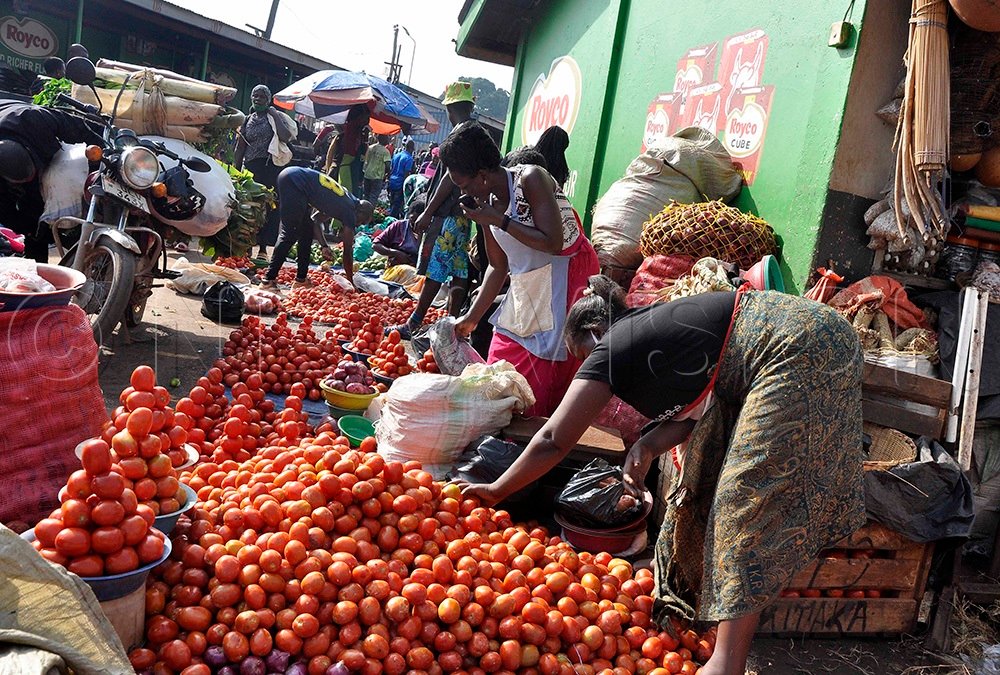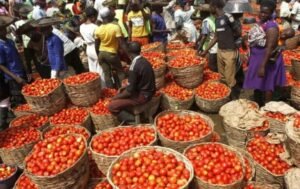
There has been a dramatic 90% reduction in tomato prices sparking widespread excitement among residents of Abuja and its surrounding areas. The cost of fresh tomatoes around December last year got so high that many households across Nigeria ate their meals without tomatoes. This means that a significant size of the country’s population is at risk of losing the health benefits of tomatoes. Tomatoes contain lycopene, beta-carotene, and other components that help protect against cancer, reduce the risk of heart disease, fight against atopic dermatitis, and support immune function, among others. Juliet Jacob of Africa Health Report, (AHR), captures the ecstasy of the FCT residents in this special report as they savour the glut, and offers recommendations for sustaining rich harvests annually, to prevent scarcity and high prices.

A Sigh of Relief
Households in Abuja are enjoying relief as the price of tomatoes has dropped by up to 90% due to a bumper harvest in major tomato-producing states. A 50kg basket of tomatoes now sells for as low as ₦12,000 to ₦15,000, in January depending on the variety. This significant price reduction is a welcome change, especially after months of high prices that strained household budgets.
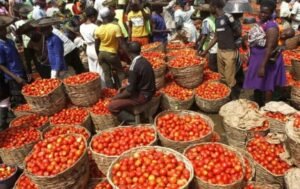
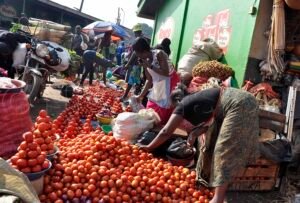

Tomatoes, a staple in Nigerian cuisine, are widely grown across the country. Nigeria is the second-largest producer of tomatoes in Africa and the 14th-largest globally, producing about 2.3 million metric tons annually. However, despite this production capacity, the country imports substantial quantities of tomato paste due to post-harvest losses and inadequate processing facilities. This paradox has made Nigeria the 13th-largest importer of tomato paste globally, spending millions annually on imports.
Tomato Prices Experience Significant Fluctuations
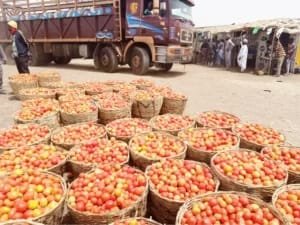
The price of tomatoes in Abuja has seen significant fluctuations over the past year. According to the National Bureau of Statistics (NBS), the average price of 1kg of tomatoes in Abuja was ₦3,992 in June 2024, the highest in the country at the time. However, prices skyrocketed to ₦140,000 to ₦150,000 for a big basket of tomatoes in Dei-Dei Market in May 2024.
In recent months, however, tomato prices have decreased significantly. As of January 2025, a big basket of tomatoes in Dei-Dei Market sells for ₦13,000 to ₦15,000. Similarly, in Mararaba’s Orange Market, the price of a 50kg basket of tomatoes dropped from ₦40,000 to ₦35,000 in September 2024 to ₦15,000 in January 2025.
The decrease in price is attributed to the bumper harvest season, which typically occurs from January to March. During this period, tomato plants produce an abundance of fruits, leading to a surge in supply and a subsequent decrease in prices.
Residents Speak Out
Many Abuja residents are taking advantage of the current surplus and affordable prices. Mrs. Grace Obinna, a resident of Kubwa, explained her strategy for managing the glut: “With tomatoes in surplus this period and at favourable prices, it is advisable to buy in bulk and stock for the scarce days. However, the lack of consistent electricity makes preservation challenging. I buy just enough to last for a week.”
Similarly, Mrs. Ifeoma Chukwu, in Dutse, Abuja shared her experience:
“We are glad that fresh tomatoes are available at affordable prices. A small basket that cost ₦8,000 or ₦9,000 a few months ago now sells for ₦5,000. This is the time to stock up for the rainy days when prices rise again.”
Another resident, Mr. Akinola Abayomi, expressed optimism but warned about price unpredictability:
“This glut won’t last forever. Once the harvest season is over, prices will climb again. I’ve bought enough to preserve, but the storage conditions are not ideal.”
Challenges of Post-Harvest Losses
Despite the bumper harvest, a significant portion of Nigeria’s tomato production—nearly 40-50%—is lost annually due to inadequate storage, poor handling, and inefficient logistics.
The chairman of the Abuja Tomato Growers Association, Alhaji Usman Abubakar, highlighted these issues:
“One of the major challenges we face during the January-to-March harvest period is the lack of sufficient processing facilities.
“This leads to massive post-harvest losses. We always advise consumers to preserve tomatoes during this period to cushion the impact of price hikes later in the year.”
Alhaji Usman emphasized the need for improved preservation methods and investments in local processing plants. He noted that these measures could reduce Nigeria’s dependence on imports and strengthen the local agricultural sector.
Bumper Harvest Hits the Market
The recent bumper harvest of tomatoes has led to a significant decrease in prices, much to the delight of residents in Abuja. The prices of tomatoes have dropped drastically, with a big basket of tomatoes selling for ₦13,000 to ₦15,000, down from ₦140,000 to ₦150,000 in May 2024.
This price slash has brought relief to households who can now afford to purchase this essential food item.
Some of the residents of Abuja who spoke with Africa Health Report (AHR), expressed their excitement and gratitude for the price decrease. “I’m so happy that the prices of tomatoes have come down,” said Mrs. Aisha Mohammed, a mother of three. “I can now afford to buy enough tomatoes for my family without breaking the bank.”
Another resident, Mr. James added, “This is a welcome development. We hope that the prices will remain stable for a while, so we can enjoy the benefits of the bumper harvest.”
However, experts have pointed out that the current gap between production and demand presents a challenge that requires urgent attention. Strengthening storage and processing facilities could ensure that Nigeria maximizes the benefits of its agricultural output.
For now, residents of Abuja are encouraged to take advantage of the price slash and preserve as much as possible before prices peak in April.
As stakeholders work to address the systemic challenges in the sector, residents are advised to make the most of this opportunity. “We’re enjoying the cheap prices of tomatoes now, but we know that prices will go up again soon,” said Mrs. Funmi Sadiq, a trader at a popular Monday market in Dutse alhaji.
“So, we’re buying as much as we can and preserving them for future use.” With the bumper harvest offering a rare opportunity for households to save on essential food items, residents are making the most of this welcome relief.
A Blessing and a Wake-Up Call for Nigeria
A surplus of tomatoes has flooded the Nigerian market, bringing joy to consumers who are taking advantage of the affordable prices. However, analysts warn that this glut is a double-edged sword, highlighting the inefficiencies that plague the agricultural sector.
Despite being a major producer of tomatoes, Nigeria still relies heavily on imports, with significant losses incurred due to inadequate storage and processing facilities.
The current situation is a wake-up call for stakeholders to address these challenges and develop a more sustainable agricultural sector.
As households enjoy the cheap prices, they are also advised to take advantage of the opportunity to save, preserve, and prepare for the uncertain months ahead.
“If you have the ability to preserve tomatoes, this is the time to use it,” said Mrs. Florence Danladi, a consumer who is taking advantage of the glut to stock up on tomatoes.
Experts predict that the prices of tomatoes will skyrocket in the coming months, making it essential for households to prepare for the lean period. They point out that by preserving tomatoes and other essential food items, Nigerians can reduce their reliance on imports and mitigate the impact of price fluctuations.
As the agricultural sector works to address its inefficiencies, consumers are advised to make the most of the current glut and prepare for the future.

